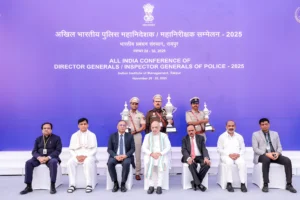
The Supreme Court bench, headed by Chief Justice BR Gavai along with Justices K Vinod Chandran and Atul S Chandurkar, will deliver its verdict on 15 September concerning petitions challenging the Waqf Amendment Act 2025.
The court had reserved its decision on 22 May after three days of detailed hearing.
During the hearings, Justice AG Masih emphasised that Islam remains Islam, irrespective of geographical or cultural differences.
His remarks came in response to Solicitor General (SG) Tushar Mehta’s submission regarding the tribal Muslim communities residing in scheduled tribal areas.
SG Mehta explained that these communities do not practise Islam in the same way as Muslims in other parts of the country.
He further stated that declaring government land as Waqf does not extinguish the government’s rights over it.
Mehta clarified that state laws prohibit the purchase of tribal land, which restricts his ability to acquire such lands.
According to him, the term ‘Waqf’ refers to the permanent dedication of property for religious purposes.
Cultural Distinctions and Legal Processes
SG Mehta highlighted the Joint Parliamentary Committee’s (JPC) observation that Muslims in tribal areas maintain a distinct cultural identity and follow Islam differently from other Indian Muslims.
He distinguished between the creation of a Waqf and donating to a Waqf, noting that even non-Muslims can donate, but establishing a Waqf requires adherence to a five-year Muslim practice period to prevent misuse.
Senior Advocate Rakesh Dwivedi, representing the state government, argued that ‘Waqf by user’ is not a principal practice of Islam.
The SG also challenged the standing of the petitioners, stating none were directly affected parties, and that a few individuals cannot represent the entire Muslim community.
He insisted Parliament possesses full legislative authority in this matter, a point which was a key reason for earlier injunctions against the law.
Chief Justice BR Gavai highlighted that the petitioners objected to the government deciding its own claim over properties, and he explained that the government received over 9.7 million public suggestions during the drafting of the amendments.
The JPC held 36 meetings, consulted 25 Waqf boards, and sought advice from various states to ensure thorough deliberation.
The Solicitor General further stated that no individual can claim ownership over government land.
The government has explicitly reserved its legal right to reclaim properties declared Waqf under ‘Waqf by user’.
The Supreme Court’s forthcoming verdict will be pivotal in shaping the legal framework around Waqf properties, especially concerning tribal lands and government rights.
The decision is expected to provide clarity on the balance between religious practices and state authority.
Also Read: SC Allows Fresh ₹5,000 Crore Payout To Sahara Depositors; Extends Deadline To December 2026
To read more such news, download Bharat Express news apps


















